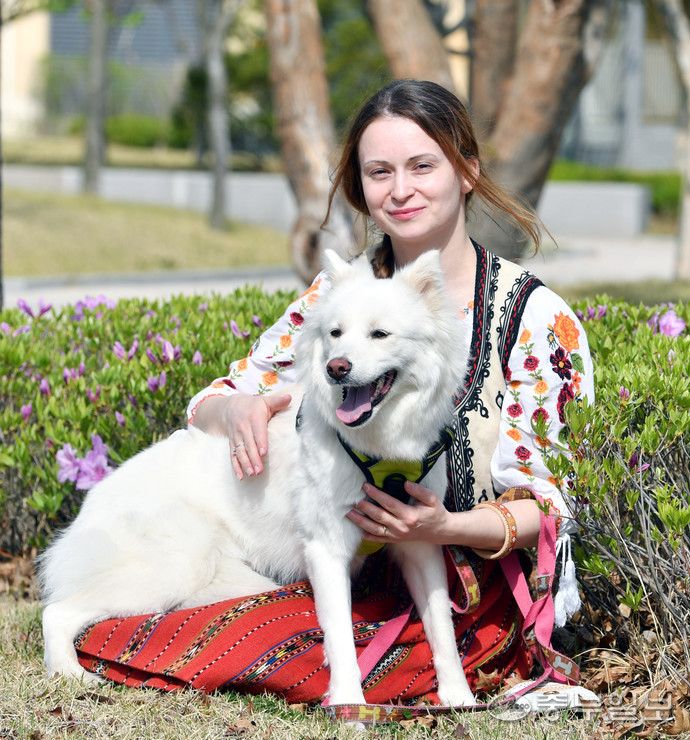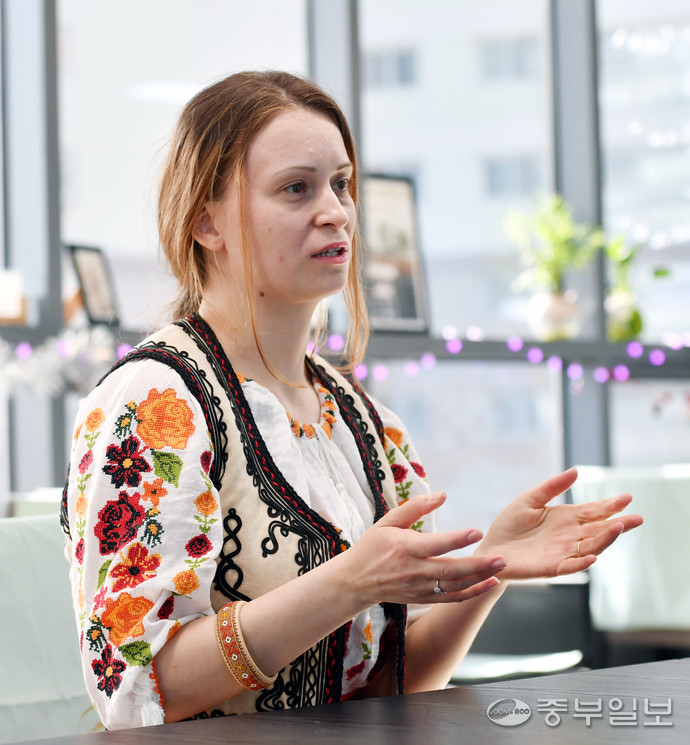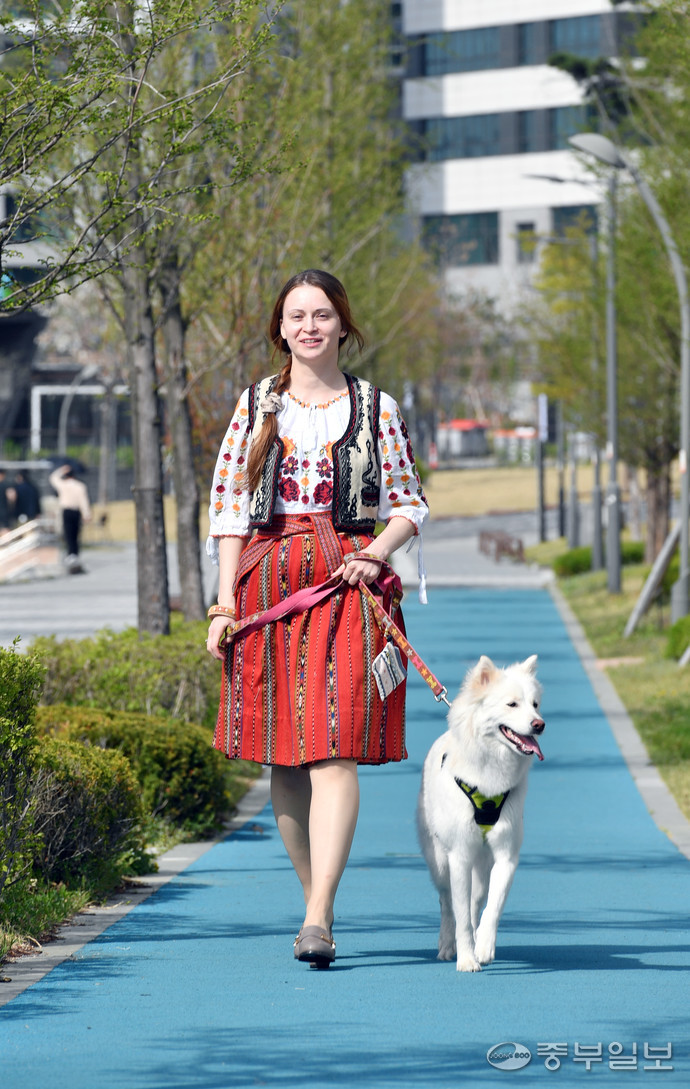This is the era of multiculturalism for 2 million people. If you look around, you can easily see neighbors with different skin colors and languages. However, Korean society's notion of multiculturalism is not keeping up with the changes of the times. To solve this problem, the Joongbooilbo has planned a ‘multi-culture story(다문화 스토리)’ that introduces multicultural neighbors living in various ways. ‘Multi-culture Story(다문화 스토리)’ aims to calmly capture the stories of multicultural people living around us and create changes in Korean society in the age of multiculturalism. -Ed-.

Marina Voicu, 34, an educational entrepreneur from Romania, came to Korea with the dream of becoming a Korean language teacher in 2014. She majored in Korean Language and Literature at Yonsei University. After graduation, she became an educator as she had hoped. She taught Korean to foreigners and Romanian and English to Koreans. It's been 10 years since she came to Korea. This Romanian girl has found a Korean spouse and is on the way to achieving economic stability. She has such a deep affection for Koreans and Korean culture that she has never thought of going back to her homeland. However, there are parts that she can not understand even after a long time. It is the attitude towards pets. she feels uncomfortable when she witnesses some people easily adopt and abandon pets. Currently working as an animal welfare campaigner who helps with the adoption of abandoned dogs, she emphasized that the wrong pet culture in Korea must be corrected. Joongbooilbo met her at a study cafe in Dongtan run by herself and talked about the pet culture in Korea.
-What made you interested in Korea?
I have been interested in Asian culture from an early age. In particular, people's appearances attracted me, because it’s a little bit different from us in Europe. At first, I tried learning Chinese and Japanese. However, it was difficult for me to study alone. Then one day, I came across a Korean drama called Boys Over Flowers, and the alphabets shown on the screen were so pretty. So, I searched for some letters online. I realized the process of the creation of Hangeul then I became a fan of King Sejong (laughs). I started studying Korean by myself.
-You seem to have a deep affection for Korea
right. I really love Korea. Since 2011, before coming to Korea, I have been promoting Korean culture in Romania. On blogs, I posted stories related to Korea translated into Romanian. In addition, I gathered people who love Korean culture like me and made a website to introduce Korean culture.
- You came to Korea in the end
After graduating from high school, I enrolled in college but dropped out due to family circumstances. Then I heard that the Korean government has a scholarship program for foreign students with good grades. I applied for the program and was selected as a scholarship student and was able to come to Korea. I came to Korea in 2014. At first, I studied at Kyunghee University's language institute, and a year later I entered Yonsei University's Department of Korean Language and Literature.
- How did the people around you react when you decided to go to Korea?
Everyone wondered. Just as Koreans do not know much about Romania, Romanians do not know much about Korea. ‘Are you going to Korea? Are you going to North Korea?’ some people asked like that. Also, since studying abroad cannot be done without money, a few family members and friends were worried about living abroad. In fact, I would not have thought of studying abroad without the scholarship given by the Korean government.
- Why didn't you return home after graduation?
I never thought about returning home. Foreign students generally have to return to their home countries, as it is difficult to extend their visas if they cannot get a job within a certain period of time after graduation. I wanted to become a Korean teacher, but it seems unreal that Korean language Institutes hire foreigners as Korean teachers. Getting a job couldn't be easy. But I didn't worry too much because I was promising a future with my Korean boyfriend, who is now my husband(laughs).
- How did you meet your Korean spouse?
My husband majored in Romanian at university. I am a friend of my husband's classmate. My husband asked for a Romanian language practice partner through his mate, and the guy introduced me to my husband. We went out sometimes and developed feelings for each other. The class was fizzled out (laughs).

- It has been almost 10 years since you came to Korea. what made you feel hard?
To be honest, the hardest thing when I first came was the food. I have been interested in animal welfare since I was young and lived as a vegetarian until I came to Korea. Ten years ago, there were almost no vegetarian restaurants. In particular, most of the food served in cafeterias on campus or in dormitories contained meat. Living as a vegetarian in Korea is more economically damaging. Fruits are too expensive to buy for students. I was forced to go on a diet. Eventually, I gave up my vegan diet.
- Was there anything difficult besides food?
Loneliness was also a big problem. To be honest, it’s not easy for foreigners to make friends in Korea. Especially in universities, most classmates are busy and overly competitive. Additionally, the fact that I entered college at a late age is the reason why it was difficult to make friends. My interests did not match those of my younger friends. I don't care about celebrities or makeup, they don't care about animal welfare.
-What are you currently doing?
After graduation, I did various jobs. I also worked as an interpreter and translator and made a study guide for the Romanian language in Korean and a Korean study guide for English. I went to an English study group and worked as a tutor. However, I was always anxious because I did not have a fixed income. Then, in consultation with my husband, we agreed to set up a study cafe that teaches English conversation. After opening, the performance of the business is getting better than expected. So, we are currently preparing a second store.

- I know you do volunteer work for abandoned dogs
I love animals. So I wanted to do something for abandoned animals. Currently, I am mainly working on connecting abandoned dogs in danger of euthanasia at shelters with people who can actually adopt them. I post photos of puppies in shelters on social media and find adopters or temporary guardians.
-You also adopted an abandoned dog
Since I came to Korea, I wanted to adopt a pet, but it was not an easy decision because I was not financially well off. Then, after the marriage, I told my husband that I wanted to adopt the dog. We decided to adopt an abandoned dog named Layla. However, in the process of adopting Layla, I thought that Korea's pet culture is too strange. I guessed that the reason why the number of abandoned dogs has increased came from Korean culture.
-Talk specifically
People adopt dogs too easily and abandon them too easily. Obviously, when adopting, people take them in as if they would raise pets like family, but if the situation does not get any better, they will choose the option to throw away the pets for their livelihood. It seems that there are quite a few people who do not consider pets as their family members but simply think of them as ornaments and objects of display they want to show off.
In fact, adopting a pet itself is a kind of behavior fully supported. Because everyone wants to have cute and pretty things. However, there are many things to take care of when they actually adopt and raise them. Owners have to invest a lot of time and money. Unfortunately, when they get tired, they give up.
-What should be done to reduce the case of abandonment?
First of all, thorough education should be conducted for those who want to adopt a pet. Owners need to be aware of exactly what constitutes animal abuse. For example, there are people who do not have their dogs walk outside and only raise them at home. It’s clearly abuse. They should take their pet for walks so that they can do outdoor activities. I also hope that the punishment for animal protection laws will be a little stricter. Now, even if people break the Animal Protection Act, they only have to pay a very small fine. If the punishment is even a little stronger, the number of abandoned puppies is likely to decrease.
-Is there anything you would like to say to those who want to adopt a dog?
We must not forget that pets are also social animals. I hope the pet owners create the time and opportunities for their pets to hang out with friends and not feel lonely.
-If you have any plans as an animal welfare social activist, please tell us.
If I could afford it, I would like to establish an animal protection organization. So, I want to continue to do activities to rescue abandoned animals.
By Seyong Lee
Photo by Kyung-min Kim
